Damaged rural roads could be abandoned, warn councils
- Published
Councillor Bert Biscoe, Cornwall Council: "We're being starved of resources"
Some small rural roads in bad disrepair could be abandoned without more funding, English councils have warned.
Four bad winters have combined with years of what the authorities deemed "underinvestment" in the network.
Peter Box of the Local Government Association said highways teams were now trapped in only being able to patch up deteriorating roads.
But a Department for Transport spokesman said enough support was being given to councils.
The councils say they face a growing £10.5bn repair backlog.
With traffic predicted to increase over the coming years, they have issued a warning.
"Unless something changes, we risk seeing large swathes of Britain's road network dangerously strewn with potholes and becoming so unsafe they will need to be shut completely," said Mr Box, who is chair of the Local Government Association's Economy and Transport Board.
But the Department of Transport said: "The government is providing over £3.4bn in this parliament and over £5.8bn in the next for local highways maintenance.
"It is the responsibility of authorities to manage their highway assets and to ensure that they have appropriate contingencies in place to deal with any severe weather that may occur from time to time."
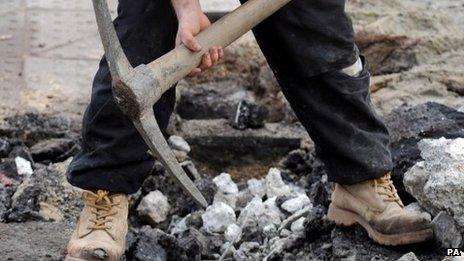
Cornwall Council says it is "starved of resources" and may have to consider withdrawing maintenance from its rural road network
Cornwall is, like many counties, hugely dependent on its rural road network, which is 2,500 miles long.
Many are classic English country lanes - single-track roads with high hedgerows winding along routes that have changed little since medieval times.
'Starved of resources'
Bert Biscoe, cabinet member for transport at Cornwall Council, said: "The problem is that for 100 years we've been maintaining the roads to the very best standards we can.
"We've lived off the fat of that. But now we're squeezed in terms of council tax and we're being starved of resources."
He said: "We're going to have to consider withdrawing maintenance from the rural road network. If we withdraw we will be pulling the legs out from under the Cornish economy."
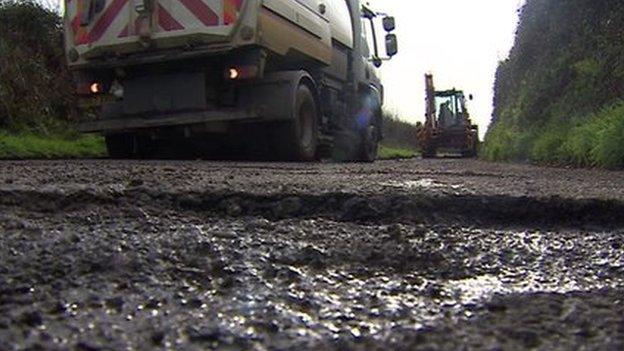
Cornwall councillor Bert Biscoe warns withdrawing roads maintenance will hit the local economy
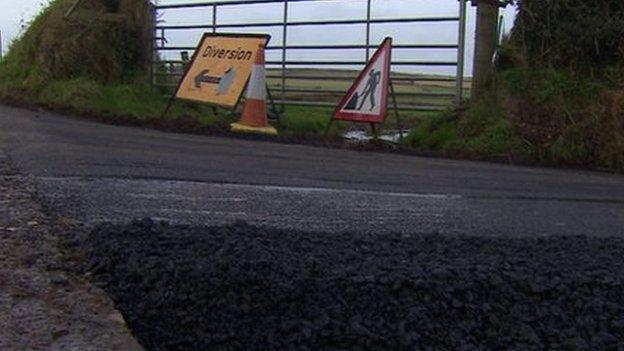
Roadworks company says fewer highway maintenance teams are out repairing roads
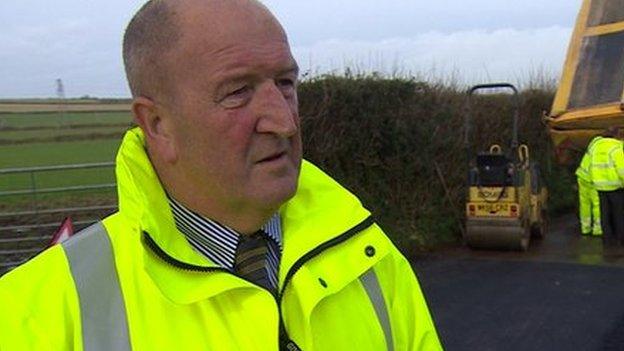
Simon Deacon, operations director for Cormac, says recent bad weather has "exposed the underinvestment of the last few years"
The severe weather of recent weeks has caused some quite sudden and dramatic surface damage in specific locations in Cornwall. But repair teams say those cracked and battered lanes can be quickly repaired - superficially at least.
A much bigger, longer term problem is the slow erosion of the underlying road structure, which has been repeatedly patched up, rather than completely re-laid.
'Underinvestment exposed'
Simon Deacon, operations director for Cormac, the service provider for highway maintenance within Cornwall, said he had many more teams out repairing roads across the county on a typical day several years ago.
"The mixture of really severe cold and wet winters has got really into the fabric of the road. The water table has risen," he said.
"That breaks the road down. The weather has exposed the underinvestment of the last few years."
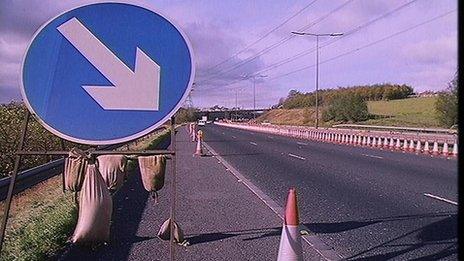
Government insists enough supports are given to highways maintenance
Ministers say councils must ensure they have adequate long-term maintenance plans in place, and contingency arrangements for more severe weather.
The government insists the money is there, but local authorities need to prioritise roads spending.
Matthew Rowe, a dairy farmer in Liskeard, said: "We haven't seen any investment.
"Someone came with a couple of shovelfuls of tarmac and then drove over them. But that's just bodging it.
"It's not acceptable. If that goes on we'll be driving on a gravel base, causing a lot of wear and tear to our machinery."
- Published14 January 2014
- Published14 January 2014
- Published30 January 2014